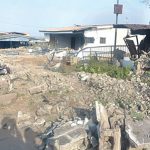THERE is no exactness in the number of casualties of the various shades of crime in the country. But the figures that emanate from different formal and official sources are horrendous. Such violent crimes include kidnapping, abduction, murder, cultism and insurgency. A report by some experts quoted the National Bureau of Statistics (NBS) as saying that in 2016, Lagos, Abuja, Delta, Kano, Plateau, Ondo, Oyo, Bauchi, Adamawa and Gombe states made the top 10 list of states with a high number of crimes. The consensus among the different respected local and international organisations, as well as agencies of the government is that the casualty figure of those killed, maimed or displaced or abducted is frightening. According to a report, of the 2.3 million people displaced by the conflict since May 2013, at least 250,000 have left Nigeria and fled into Cameroon, Chad or Niger. Boko Haram killed over 6,600 in 2014. The group carried out mass abductions, including the kidnapping of 276 school girls from Chibok in April 2014. And from available records, the casualties of the heinous crimes by the group are not just civilians, especially women and children; military men have lost their lives in violent attacks by insurgents.
As the battle became fierce and debilitating, the need for regional collaboration became imperative. Beyond the offer of military assistance in the area of intelligence and grants, the international community and developed countries came to the aid of Nigeria and other countries in the West African sub-region that remained the major attacks from insurgents. The option of regional cooperation became crucial. For instance, starting in late January 2015, a coalition of military forces from Nigeria, Chad, Cameroon, and Niger began a campaign against Boko Haram. At the local level, there is the Joint Task Force (JTF), which comprises all the army, Navy and the Air force, just as the security challenges necessitated the increasing role for local hunters and other groups to collaborate with state actors, especially the Police as buffer particularly on intelligence gathering. The great danger posed by Boko Haram and herders led to their declaration as among the deadliest terrorist groups by the international community.
Apart from inflicting heavy human casualties on the country, the criminals have caused huge economic losses for Nigeria. The various shades of violence induced by criminals and insurgents have left many businesses prostate, with consequent job losses and economic downturn resulting in further dire impoverishment of the people. The economy of a couple of the geopolitical zones are mostly affected by the crisis, just as the battle against crimes has been a major drain of the scarce resources needed to give fillips to comatose productive sector of the nation’s life.
Besides, while the military has consistently come up with different operational modes, quite a number of state governments have equally created varying crime-bursting outfits to handle extra security duties bothering on expediency and emergency. For instance, it was such exigencies that even led to the military top hierarchy once admitting that its personnel are involved in such operations in more than two thirds of the 36 states and the Federal Capital Territory (FCT).
It is in the light of the foregoing that a lot of eminent persons and groups have rotationalised the emergence of the security outfit, Operation Amotekun, initiated by the governors of the six states in the South-West zone of the country. The area has had a fair share of the violent crimes resulting in gruesome killings, kidnapping and abduction for ransom by hardened criminals. At a time, the creeks of Lagos, Ondo and Ogun states became hideouts for the criminals, just as the forests of the other states in the South-West turned into a den of criminals. The consequence was the creation of a climate of uncertainty, fear and helplessness as the crisis became too overwhelming and awesome for state actors statutorily saddled with protecting lives and property.
The importance of that primary duty of the government was corroborated by the governor of Oyo State, Seyi Makinde when Operation Amotekun was launched in Ibadan, the state capital. “We took the oath to defend the Constitution of the Federal Republic of Nigeria and we haven’t forgotten that. What we seek to do is keep our people safe by not fighting Nigeria but the elements among us that seek to destabilise our region,” Governor Makinde stated. Apparently, the governor was referring to Chapter 2 in Section 13 of the 1999 Constitution (As amended) under the title: Fundamental Objectives and Directive Principles of State Policy. His Ekiti State counterpart, Dr Kayode Fayemi also subtly denounced insinuations in a few quarters about the conception and actualisation of Operation Amotekun. According to him, there no ambiguity about the vision and mission of the governors on the initiative: “Our primary interest is the security and safety of our people, and we will continue to do all within our powers to push the frontiers of this security outfit.” Just like many other concerned citizens on the state of insecurity in parts of the country and have consistently advocated diversity and pragmatism in the approach to tackle the crisis, Fayemi also talked about collaboration as opposed to fear of possible clash of interest. He declared: “Amotekun is a complement that gives our people confidence that they are being looked after by those they elected into office.”
The Federal Government and the military authorities have lauded the complementary role some civilians under different operations to the success of the war on insurgency in the North-East. Both the past and present administration in Bornu State, which is the worst-hit by the activities of insurgents, have also praised the contributions of a group of hunters to the success of the battle against Boko Haram and other insurgent groups that have wreaked havoc on the citizens in the North-East. It is for this reason and other factors that a number of individuals and groups have hinged their backing for the Operation Amotekun initiative in the South-West. They premised their support on the belief that the state of insecurity across the country requires a multi-dimensional approach to make a headway. The governor of Ondo State, who doubles as the chairman of the forum of governors from the South-West, Rotimi Akeredolu, corroborates that submission. He was apt in underscoring the motive behind Amotekun. “Amotekun is only one of the many solutions being planned to tackle the many social, economic problems facing our region,” Akeredolu stated.
With the launch of the security outfit, there are huge public expectations on its modus operandi when it eventually hits the ground running. Part of the expectations bothers on logistics, funding and conduct of the personnel, as these factors and many others have proven to pose serious challenges to security outfits in the country over the years. It is apparent that the launch of the outfit marks another phase in the quest by the governors to partner the people and other state actors in the security circle to guarantee the sanctity of the primary assignment and duty of government to the citizens.
In the meantime, the leaders from other zones of the country seem to be watching with bated breath on the success of Operation Amotekun. Many of them have not just lauded the initiative to curb the menace of criminals whose activities have not only kept Nigerians spellbound but also impacted negatively on the economy and the image of the country in the international community. Mass-based organisations like the Ohanaeze Ndigbo, the Ijaw Youth Council (IYC) and others see the initiative and the launch as auspicious and epochal.






